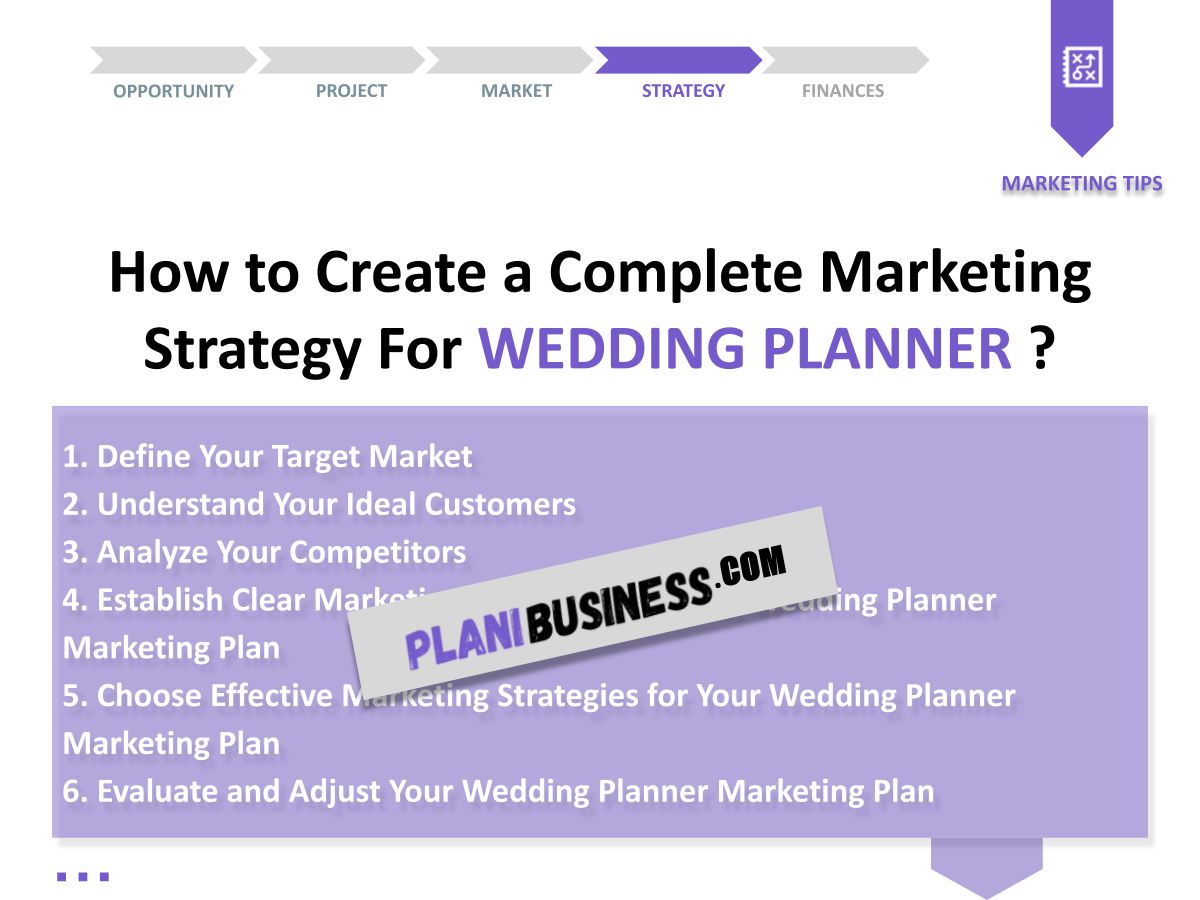Are you ready to elevate your wedding planning business? You’re not alone! A staggering 70% of wedding planners admit they struggle with effective marketing strategies. This is where a well-crafted Wedding Planner Marketing Plan comes into play. It’s essentially your roadmap for reaching clients, building your brand, and ultimately, ensuring your business thrives in a competitive market.
Understanding your target market is the first step in your Wedding Planner Marketing Plan. It helps tailor your services to meet their needs. When you know who you’re trying to reach, you can design your marketing efforts to resonate with them. Here’s a breakdown of how to define your target market:
| Aspect | Details |
|---|---|
| Demographics | Age, income, location, etc. |
| Psychographics | Interests, values, lifestyle choices. |
To effectively define your target market, consider conducting surveys or interviews with past clients. This helps you gather valuable data on their preferences and expectations. Additionally, using social media insights can provide you with demographic information about your followers, which can be incredibly beneficial.
Next, let’s delve into understanding your ideal customers. Knowing your ideal customers will help you create targeted marketing messages that resonate with them. Here’s what to focus on:
| Criteria | Details |
|---|---|
| Age Range | 25-35 years old |
| Engagement Duration | 6 months to 1 year |
Identifying your ideal customers goes beyond just demographics. Consider their interests, values, and what they look for in a wedding planner. For instance, do they prefer a traditional ceremony, or are they more inclined towards a modern, unique experience? Craft your marketing messages to speak directly to these desires.
Another effective method is to create customer personas. These fictional representations of your ideal clients can help you visualize their needs and preferences. By referring to these personas when creating marketing materials, you can ensure that your messaging is always on point.
Analyzing your competitors is a crucial step in developing your Wedding Planner Marketing Plan. By understanding what others in the industry are doing, you can identify gaps in the market that your business can fill. Here’s how to effectively analyze your competitors:
| Competitor | Strengths | Weaknesses |
|---|---|---|
| Competitor A | Strong online presence | High pricing |
| Competitor B | Affordable packages | Poor customer service |
Start by listing your top competitors in the wedding planning industry. Analyze their websites, social media channels, and customer reviews to get a sense of their strengths and weaknesses. What services do they offer? How do they engage with their clients? This information can be invaluable when crafting your unique selling proposition (USP).
Additionally, consider using tools like SWOT analysis (Strengths, Weaknesses, Opportunities, Threats) to systematically evaluate your competitors. This can provide you with a clear picture of where your business stands in comparison and help you position yourself more effectively in the market.
Now that you have a good understanding of your target market and competitors, it’s time to establish clear marketing objectives for your Wedding Planner Marketing Plan. Setting clear, measurable objectives will keep your marketing efforts focused and aligned with your business goals. Here’s how to create effective marketing objectives:
| Objective | Measurement |
|---|---|
| Increase brand awareness | Website traffic, social media engagement |
| Generate leads | Number of inquiries, bookings |
Start by defining what success looks like for your business. Do you want to increase inquiries by a certain percentage? Or perhaps you want to grow your social media following? Whatever your goals may be, make sure they are specific, measurable, attainable, relevant, and time-bound (SMART).
For example, instead of saying “I want more clients,” you could say “I want to increase my inquiries by 25% over the next six months.” This level of specificity allows you to track your progress and adjust your strategies as needed.
Finally, remember to review and adjust your marketing objectives regularly. The wedding industry is constantly evolving, and being flexible will allow you to stay ahead of the curve.
Choosing effective marketing strategies is a pivotal aspect of your Wedding Planner Marketing Plan. The right strategies will help you connect with your target audience and achieve your marketing objectives. Here’s a look at some effective marketing strategies you can implement:
| Strategy | Description |
|---|---|
| Social Media Marketing | Engage clients on platforms like Instagram and Pinterest. |
| Email Marketing | Send newsletters and special offers to subscribers. |
Social media platforms are a fantastic way to showcase your work and engage with potential clients. Create visually appealing content that highlights your previous weddings, behind-the-scenes preparations, and client testimonials. Use hashtags effectively to reach a broader audience, and don’t forget to engage with your followers by responding to comments and messages.
Email marketing is another powerful tool. Build an email list by offering a free guide or checklist in exchange for contact information. Regularly send out newsletters with updates, tips, and special promotions. This keeps your business top-of-mind for potential clients and encourages referrals from past clients.
Additionally, consider hosting workshops or webinars on wedding planning topics. This not only positions you as an expert in the field but also allows you to connect with potential clients in a more personal setting. Offering value upfront can create trust and lead to future bookings.
Once you have implemented your strategies, it’s essential to evaluate and adjust your Wedding Planner Marketing Plan regularly. Evaluation helps you determine what’s working and what’s not, allowing you to make necessary adjustments. Here’s how to effectively evaluate your marketing efforts:
| Action | Frequency |
|---|---|
| Review analytics | Monthly |
| Gather client feedback | After each event |
Utilize tools like Google Analytics to track website traffic, social media insights to monitor engagement, and customer relationship management (CRM) systems to analyze client interactions. This data will help you identify trends and areas for improvement.
In addition, gathering feedback from clients after each event is invaluable. Send out surveys to ask about their experience, what they loved, and areas where you could improve. This not only provides you with insights but also shows your clients that you value their opinions.
By regularly evaluating your marketing strategies, you can adapt to changes in the market and ensure your Wedding Planner Marketing Plan remains effective and relevant.
Now that we’ve covered the essential components of your Wedding Planner Marketing Plan, let’s look at some practical examples to illustrate how these concepts can be applied. Here’s Example N°1 of a marketing plan tailored for wedding planners:
| Steps | Actions | Details |
|---|---|---|
| 1 | Target Market | Young couples in urban areas |
| 2 | Ideal Customers | Couples aged 25-30 |
| 3 | Competitors | Analyze local wedding planners |
| 4 | Marketing Objectives | Increase inquiries by 20% |
| 5 | Marketing Strategies | Use Instagram ads targeting local couples |
| 6 | Evaluation | Monthly performance review |
This example highlights how to define your target audience and set measurable goals. By utilizing social media advertising, you can reach your target demographic effectively.
Next, let’s dive into Example N°2 of a marketing plan for wedding planners:
| Steps | Actions | Details |
|---|---|---|
| 1 | Target Market | Destination wedding couples |
| 2 | Ideal Customers | Couples looking for unique experiences |
| 3 | Competitors | Research top destination planners |
| 4 | Marketing Objectives | Expand reach by 30% |
| 5 | Marketing Strategies | Collaborate with travel bloggers and influencers |
| 6 | Evaluation | Quarterly updates |
This plan focuses on a niche market—destination weddings. By partnering with travel influencers, you can gain credibility and reach potential clients who are passionate about unique wedding experiences.
As you can see, applying these examples to your own Wedding Planner Marketing Plan can help clarify your approach and provide a solid foundation for your marketing efforts.
Continuing with our practical examples, here’s Example N°3 of a marketing plan specifically designed for wedding planners:
| Steps | Actions | Details |
|---|---|---|
| 1 | Target Market | Eco-conscious couples |
| 2 | Ideal Customers | Couples prioritizing sustainability |
| 3 | Competitors | Analyze green wedding services |
| 4 | Marketing Objectives | Grow eco-friendly portfolio |
| 5 | Marketing Strategies | Host eco-themed events |
| 6 | Evaluation | Feedback from clients |
This example emphasizes the growing trend of sustainability in weddings. By hosting eco-themed events, you can attract clients who are passionate about the environment and looking for planners who align with their values.
Next, let’s explore Example N°4 of a marketing plan tailored for wedding planners:
| Steps | Actions | Details |
|---|---|---|
| 1 | Target Market | Luxury wedding clients |
| 2 | Ideal Customers | Affluent couples |
| 3 | Competitors | Study high-end planners |
| 4 | Marketing Objectives | Increase premium bookings |
| 5 | Marketing Strategies | Luxury venue partnerships |
| 6 | Evaluation | Yearly analysis |
This marketing plan is focused on attracting high-end clients. By partnering with luxury venues, you can position yourself as a premier wedding planner, appealing to couples looking for exceptional experiences.
These examples demonstrate how specific targeting and strategic planning can enhance your Wedding Planner Marketing Plan, making it easier to connect with your desired clientele.
Continuing with our examples, here’s Example N°5 of a marketing plan tailored for wedding planners:
| Steps | Actions | Details |
|---|---|---|
| 1 | Target Market | Couples with cultural weddings |
| 2 | Ideal Customers | Couples wanting personalized ceremonies |
| 3 | Competitors | Identify niche planners |
| 4 | Marketing Objectives | Attract diverse clientele |
| 5 | Marketing Strategies | Community engagement events |
| 6 | Evaluation | Client satisfaction surveys |
This plan emphasizes the importance of cultural inclusivity in wedding planning. By organizing community engagement events, you can connect with couples who are looking for planners that understand and respect their cultural traditions.
Next, let’s look at Example N°6 of a marketing plan designed for wedding planners:
| Steps | Actions | Details |
|---|---|---|
| 1 | Target Market | Budget-conscious couples |
| 2 | Ideal Customers | Couples planning affordable weddings |
| 3 | Competitors | Evaluate low-cost services |
| 4 | Marketing Objectives | Increase bookings by 15% |
| 5 | Marketing Strategies | Offer budget-friendly packages |
| 6 | Evaluation | Cost analysis |
This marketing plan targets couples who are looking for affordable wedding options. By offering budget-friendly packages, you can attract clients who may feel overwhelmed by traditional wedding costs.
Finally, here’s Example N°7 of a marketing plan for wedding planners:
| Steps | Actions | Details |
|---|---|---|
| 1 | Target Market | Same-sex couples |
| 2 | Ideal Customers | Couples seeking inclusive services |
| 3 | Competitors | Explore LGBTQ+ friendly planners |
| 4 | Marketing Objectives | Build trust and visibility |
| 5 | Marketing Strategies | Partner with LGBTQ+ organizations |
| 6 | Evaluation | Community feedback |
This final example focuses on the LGBTQ+ community, emphasizing the importance of inclusivity in wedding planning. By partnering with LGBTQ+ organizations, you can build trust and visibility within this market.
These examples illustrate the versatility and effectiveness of a well-structured Wedding Planner Marketing Plan. By tailoring your approach to specific markets, you can effectively connect with diverse clientele and establish a successful wedding planning business.
Conclusion
In conclusion, developing a comprehensive Wedding Planner Marketing Plan is essential for any wedding planning business looking to thrive in a competitive market. By understanding your target audience, analyzing your competitors, and implementing effective marketing strategies, you can build a successful brand that resonates with couples planning their special day. For those looking to take their planning to the next level, consider utilizing a good business plan template for your wedding planning venture. You can find one here.
Additionally, if you want to dive deeper into the world of wedding planning, check out our articles on How to Set Up a Wedding Planner Business? and learn about conducting a SWOT analysis for Wedding Planners. These resources will help you lay a solid foundation for your business and ensure you’re equipped with the knowledge to succeed.
FAQ
- What is a wedding planner marketing plan?
A wedding planner marketing plan is a strategic document that outlines how a wedding planner will attract and retain clients. It includes target market analysis, marketing objectives, and strategies for promotion. - Why do I need a marketing plan as a wedding planner?
A marketing plan helps you identify your target audience, understand your competitors, and set clear objectives. It provides direction for your marketing efforts and helps you measure success. - How do I identify my target market as a wedding planner?
To identify your target market, consider demographics such as age, income, and location. Conduct surveys or analyze social media insights to better understand your ideal customers. - What marketing strategies are effective for wedding planners?
Effective marketing strategies include social media marketing, email campaigns, SEO optimization, and hosting events. Tailor your strategies to resonate with your target audience. - How can I evaluate my marketing plan?
Regularly review analytics from your website and social media platforms. Collect feedback from clients and adjust your strategies based on performance metrics. - What is the importance of competitor analysis?
Competitor analysis helps you understand the strengths and weaknesses of other wedding planners. This knowledge allows you to identify gaps in the market and position your services effectively. - How often should I update my marketing plan?
Your wedding planner marketing plan should be updated regularly, at least annually, or whenever there are significant changes in your business or the market. - What is a SWOT analysis and how is it useful for wedding planners?
A SWOT analysis identifies your business’s strengths, weaknesses, opportunities, and threats. It helps you develop strategies to capitalize on strengths and opportunities while addressing weaknesses and threats. - Can I create a marketing plan without prior experience?
Yes, you can create a marketing plan without prior experience. There are many resources available, including templates and guides, that can help you develop a solid plan. - How can I attract clients as a new wedding planner?
As a new wedding planner, focus on building a strong online presence through social media and a professional website. Networking with vendors and attending bridal shows can also help you gain visibility and attract clients.







